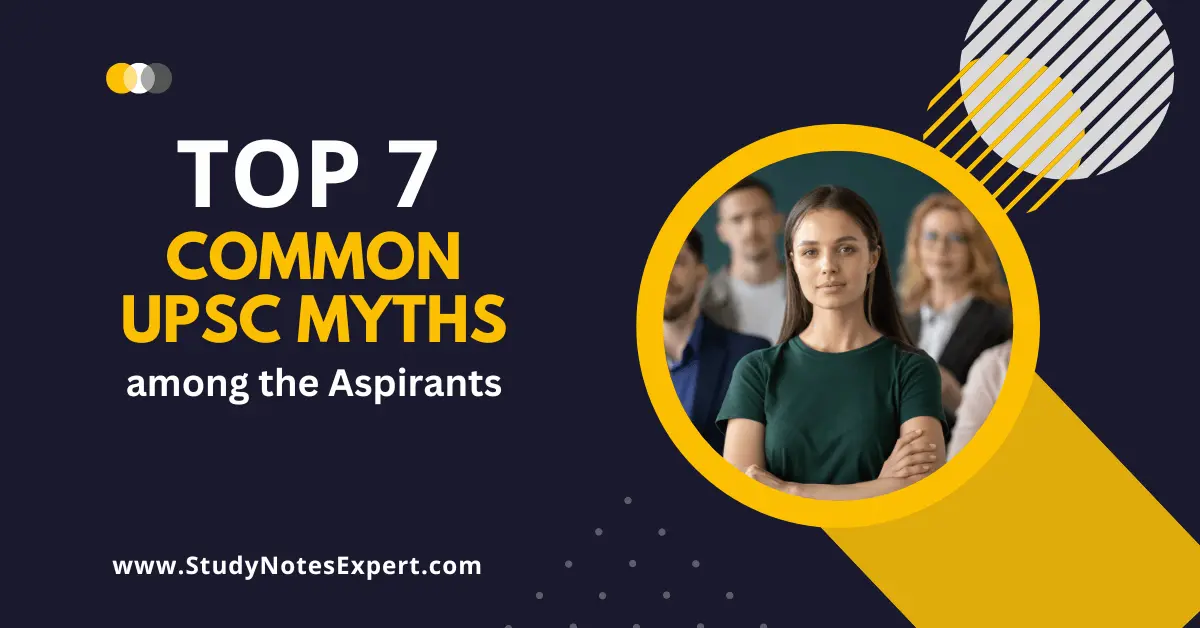One of the most difficult exams to pass in India is the UPSC civil services examination. In the preliminary round, more than 10 lakh applicants submit applications for around 1,000 openings. Due to this, there are so many myths related to the exam. Students often get confused due to these myths. This affects their preparation journey. So here are some of the popular UPSC Myths.
Top 7 UPSC Myths of Students
1. UPSC Examination is the Toughest Exam
Both casual observers and IAS hopefuls frequently claim that the IAS exam is the hardest in the nation. Others even refer to it as the “mother of all tests.” This is due to the exam’s low pass rate of less than 1%. In actuality, fewer than half of the more than 9 to 10 lakh people who apply for the exam sit for it. Additionally, not every one of the 4 to 5 lakh applicants who show up for the UPSC preliminary exam is sincere.
Many candidates only show up once to get a feel for the exam because it gives them at least six chances to pass, depending on their eligibility for the IAS. This exam is just another one. Life is the ultimate exam. Consider IAS preparation as a stage in life rather than Life itself. Everyone who has passed the civil services examination will tell you that the key to passing this “mother of all exams” is persistence and commitment, along with receiving the proper guidance. The Thought Tree is one such IAS coaching in Jaipur where you can get proper guidance and mentorship.
2. Know Everything
The idea that an IAS applicant needs to know and be knowledgeable about everything is another fallacy related to the UPSC Exam that causes a candidate stress. Certainly, the UPSC Syllabus is extensive. But it is also defined, except for the current affairs part. There is a method for covering current affairs part, even daily. A methodical approach where the candidate reads significant periodicals, RSTV programs, and the daily news is sufficient.
3. More The Number Of Hours, the More The Marks
The most widespread UPSC myth is that one needs to spend 12 to 18 hours studying to pass the Civil Services Examination. However, depending on how well you prepare, experts and people who passed the exam advise that 6–10 hours of study every day is sufficient. The quality of hours invested counts for this exam, even though the scheduling is up to the individual. The time you can regularly put in the effort is more crucial than making a huge effort one day and then skipping studies for a few days.
4. Can’t Clear UPSC Without Having Very Good English
UPSC only requires a basic understanding of English; it does not require excellent English. Additionally, UPSC permits applicants to write in their native language for the Mains exam. It’s also helpful to know that individuals can strengthen their language skills despite them being weak. But remember that one needs a basic command of the language to comprehend the question and produce rational, adequately relevant answers.
5. Only Academic Toppers Can Crack UPSC
The lack of validity of this notion is simply demonstrated by a glance at the list of IAS top performers each year. Many toppers attend unremarkable high schools and colleges. Many of them are from underdeveloped areas of the nation where there is little to no opportunity for UPSC guidance of any kind.
In actuality, many of the best students had mediocre or poor academic records. All of this, however, has no impact on the UPSC results. How a student approaches the UPSC exam, how they prepare for it, what sort of advice is provided, and how rigorously the IAS preparation is done is everything that matter in this exam. Previous academic success is completely irrelevant.
6. Memorize Everything
Another common UPSC Myth is that candidates must memorize every single thing. Many aspirants strive to memorize everything and follow different sources to accomplish it. They won’t benefit from this at all during the examination. The secret technique is to balance the ideas and grasp the basics well. With enough practice, even the writing skills for the answers can be enhanced. To achieve the greatest outcomes, maximize your study time before the exam, take mocks, and attempt the previous year’s question papers.
7. Attempt The Maximum Number Of Questions
For wrong answers, the UPSC prelims feature negative markings. This tells that candidates should be completely certain of their responses and that guessing the answers would be of no use. Instead, it can backfire. However, it is best to use the principle of logical guessing through elimination, and for doing this, you have to practice as many preliminary exam papers and mocks as possible.

